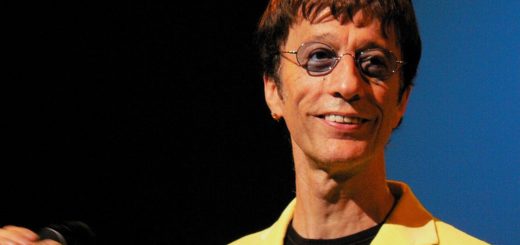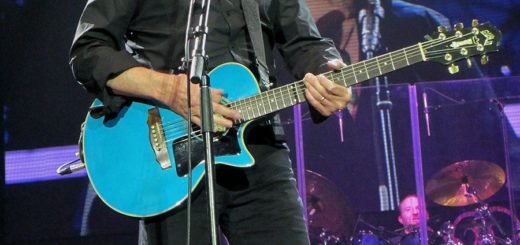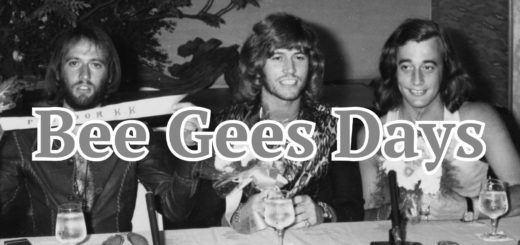Barry Gibb “NPR interview” October 22, 2016
Barry Gibb spoke to NPR’s Scott Simon in an interview broadcast on October 22, 2016.
NPR: The Bee Gees have sold more than 200 million records and they are in the Songwriters and Rock and Roll Halls of Fame. They also wrote huge hits for a multitude of other stars including Barbra Streisand, Diana Ross, Kenny Rodgers and Dolly Parton.
There is only one surviving member of the Bee Gees. That’s Barry Gibb. His brother Maurice died in 2003 and Robin in 2012. Barry Gibb joins us from his home in Miami. He has a new solo album, his first in more than 30 years. It’s called "In the Now."
Mr. Gibb, thanks for being with us.
Barry: My pleasure.
NPR: Let’s talk about this new album, beginning from the title track ‘In the Now.’ Let’s listen to some of it first.
B: Okay.
NPR: Is this a song about someone?
B: In the Now? No, it’s about time, and really trying to obliterate it, and trying not to acknowledge that it exists at all, ‘cause I think that’s what we do. You know we tend to follow the clock. I think it’s about the idea of pleasure, or the idea of having fun. And really I’m in defiance of time.
NPR: I ask because I noticed the album is dedicated to your mother.
B: Yes, Mom passed about two months back. She created us and she was very often quite keen to tell us that. So it was obvious to me that the album should be dedicated to her.
NPR: Let’s listen to another song if we could?
B: Yes.
NPR: ‘End of the Rainbow.’ Where does this song come from, Mr. Gibb?
B: I think it comes from our lives growing up in Australia. And I got to sing it… I went to visit with Robin because I wanted to dedicate it to him.
NPR: So this was for your brother Robin that was in a coma at that point?
B: He was in a coma, yes. I visited him at night because it was quiet and there were no other relatives around. So I sat next to him and I sang the beginning of the verse and the bridge to this song. I don’t know if he heard me honestly, but I hope he did. And I hope he understood what I’d tried to tell him in the last few years, which was “It’s okay, Rob. The dream came true,” you know. Whatever the dream was about, becoming famous, or becoming a big pop group, or whatever those things were when you were a kid, it all happened. And also we had more success than we thought we could have.
NPR: Did you find at the same time, Mr. Gibb, that being so wildly successful on a level that very few people are or have ever been has a cost, also?
B: Umm, it’s okay. You know you get used to it. I’ve seen people like Paul McCartney deal with it. And you know he’s quite a magnet for people who really wanna walk up and shake his hand. I don’t think I want that kind of fame. I don’t really have any qualms about privacy or things like that. I actually enjoy going to Walgreen’s. I enjoy meeting people and keeping my feet on the ground.
NPR: So you go to Walgreen’s and get a dental floss like anyone else?
B: (laughs) Perhaps not dental floss, but moisturizing cream? You go name it.
NPR: Well, you know if the photos I’ve seen recently on your new album are any indication, I’d say the moisturizer is doing its job.
B: (laughs) Well, I just like to wander about. I enjoy driving around and you know the weather is so beautiful here that you can but think life is okay, life is okay.
NPR: If you indulge us, we want to share with you. We found an old clip of you, Robin and Maurice performing on an Australian TV show we think this is 1960 performing, let me put it this way, performing the words of a Nobel Literature laureate.
<Young Bee Gees singing ‘Blowin’ In the Wind.’>
NPR: Do you remember that?
B: I don’t… You know that’s absolutely shocking. Where did you get that?
NPR: It was on YouTube, I’m told.
B: It’s remarkable! (laughs) I mean it’s like… That was Mo right at the top, you know. And Robin had a higher voice, so he’d always take the middle harmony. And I do not know to this day how they’d ever figured that out in their lives, how to do three-part harmony. I think it was the Mills Brothers. My father was a Mills Brothers fan and he was always bringing new records home. So the idea of harmony came to us very early, but that was very moving. I have never heard that. I love Bob Dylan.
NPR: Mr. Nobel laureate Dylan at this point.
B: Absolutely. And no one deserves it more than him.
NPR: Is it fair to say that you had a loving but complicated relationship with your family, your brothers?
B: Yeah, I think that probably is the same as any big family, you know, whether it’s brothers or sisters. And I think that we had a lot of conflicts in our lives between all… Don’t forget there were four brothers, you know, if you include Andy.
NPR: That’s right. Of course.
B: And all four of us wanted to be pop stars. Andy got to do that. And the three of us all wanted to do that but we did it together. And make no mistake, we all wanted to be pop stars in our own right. So there was a lot of conflict in that. So that’s it. That’s what we wanted. But you know I got to really think that we were all blessed because we had to have loved each other very much, otherwise we couldn’t have been together for forty-five years. So… that element of it. Yeah, you can fight,but you never stop loving each other.
NPR: Barry Gibb, his new album "In the Now." Thanks so much for being with us, Mr. Gibb.
B: Oh, thank you, Sir. My pleasure!
Transcribed by BGD
{BGD – November 2016}


